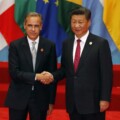This month, The University of Toronto (UofT) was ranked the fourth best university in the world for its output and impact of scientific papers, 33 positions ahead of the next best Canadian university.
The ranking, by the National Taiwan University, (NTU) has been a benchmark for institutions’ research performance across agriculture, engineering, medicine, and the life, natural, and social sciences since 2007.
Since 2022, NTU’s data also shows that universities in China have remarkably grown in article citations and output, becoming a new global contender in scientific research.
The U.K.’s University of College London came first, followed by Harvard and Stanford in the United States. With a ranking of 60.5 out of 100, the University of Toronto ranked fourth, beating out both the University of Oxford and Johns Hopkins University.
U of T’s ranking was 33 spots ahead of the next best Canadian research university, the University of British Columbia (UBC), which scored 46.9 and ranked 37 globally. Then came McGill University ranked 57.
The NTU ranking indicators include research excellence, through high-impact journal contributions, papers in the top one percent of the decade’s most cited; research impact, through citation numbers from the past two years and decade; and research productivity, through the measure of papers published over the same time frames.
Each is measured as a score out of 100. The last four markers are divided by the university’s full-time academic staff to control for faculty size.
“Many other universities set themselves apart in only a few areas of research. U of T is a global leader in so many areas, including medicine, engineering, artificial intelligence, social sciences, business, and more,” Leah Cowen, U of T’s vice-president, research and innovation, and strategic initiatives, told The Hub in an email. “This allows for a level of multidisciplinary research that few others can match, bringing together experts here that would rarely work together elsewhere.”
In medical research, the school ranked second (the same spot as last year) and third (up three spots) in social sciences. Last year, it ranked fifth worldwide. In 2021, it reached its record of third overall.
In 2019, NTU scores tanked, presumably due to lack of publication during the COVID-19 pandemic. Since then, prominent U.K. and U.S. universities continued to see a decline—namely Stanford, Oxford, Johns Hopkins, and the Massachusetts Institute of Technology (MIT).
A rising China
Chinese university scores have risen demonstrably enough that by 2024, Zhejiang University and Tsinghua University, in Beijing, ranked seventh and eighth among the top 10 universities for scientific research worldwide. In 2022, those universities ranked 46 and 36 globally.
In 2022 for the first time, China overtook the U.S. for contributions to articles published in the Nature Index, a group of high-quality natural science journals, according to Nature. A year before that, China led the world in physical sciences and chemistry papers.
This year, the Chinese universities of Zhejiang and Shanghai Jiao Tong, ranked eighth and 12th overall, behind only the University of Toronto and Harvard in their score of articles published over the last 11 years, according to NTU rankings.
However, China’s institutions have recently faced significant allegations of scientific fraud. Quantity, not quality, has apparently prompted Chinese researcher’s promotions and funding, incentivizing the mass production of “dodgy” papers, The Economist reported last February, potentially contributing to competitive article production scores.
Across the past two decades, Chinese papers were the fourth most retracted from scientific journals on the suspicion of research misconduct, following Russia, Pakistan, and Saudi Arabia.
UBC was the only other Canadian institution to surpass one of the world’s top 15 universities, MIT, in its score for the number of articles produced in the last decade.










